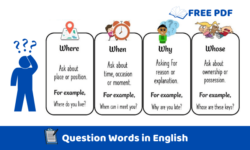Understanding Subject-Verb Agreement in English
Subject-verb agreement is a fundamental aspect of English grammar that ensures sentences are clear and comprehensible. This concept means that the subject of a sentence must match the verb in number and person.
What is Subject-Verb Agreement?
In English, the verb must agree with its subject in both number (singular or plural) and person (first, second, or third person). This agreement is crucial for making sentences grammatically correct and understandable.
Subject-Verb Agreement means that subjects and verbs must always agree in number!

Basic Rules
- Singular Subjects and Singular Verbs:
- A singular subject takes a singular verb.
- Example: The cat (singular) runs (singular) fast.
- Plural Subjects and Plural Verbs:
- A plural subject takes a plural verb.
- Example: The cats (plural) run (plural) fast.
Examples
- Singular:
- She (singular subject) is (singular verb) a teacher.
- The dog (singular subject) barks (singular verb) loudly.
- Plural:
- They (plural subject) are (plural verb) students.
- The dogs (plural subject) bark (plural verb) loudly.
Special Cases
Compound Subjects
When a subject is made up of two or more nouns connected by “and,” it usually takes a plural verb.
- Example: Tom and Jerry (compound subject) are (plural verb) friends.
However, if the compound subject refers to a single entity, it takes a singular verb.
- Example: Bread and butter (single entity) is (singular verb) my favorite breakfast.
Subjects Joined by “Or” or “Nor”
When two subjects are joined by “or” or “nor,” the verb agrees with the subject closest to it.
- Example: Either the teacher or the students (plural subject) have (plural verb) the keys.
- Example: Neither the students nor the teacher (singular subject) has (singular verb) the keys.
Indefinite Pronouns
Some indefinite pronouns are singular and take singular verbs, while others are plural and take plural verbs.
- Singular: Everyone (singular) is (singular) welcome.
- Plural: Few (plural) are (plural) missing.
Common Mistakes
Mistake: Misidentifying the Subject
- Incorrect: The group of students are going on a trip.
- Correct: The group (singular subject) of students is (singular verb) going on a trip.
Mistake: Ignoring Compound Subjects
- Incorrect: The book and the pen is on the table.
- Correct: The book and the pen (compound subject) are (plural verb) on the table.
Tips for Ensuring Subject-Verb Agreement
- Identify the Subject:
- Determine whether the subject is singular or plural.
- Check the Verb:
- Ensure the verb matches the subject in number and person.
- Be Aware of Special Cases:
- Pay attention to compound subjects and subjects joined by “or” or “nor.”
- Practice:
- Regular practice and exposure to correct sentences help reinforce the rules.
Words and rules that can cause confusion with Subject-Verb Agreement:
Indefinite Pronouns (always singular):
- anybody: Anybody can join us.
- either: Either option is fine.
- neither: Neither of them is coming.
- one: One of the students is absent.
- anyone: Has anyone seen my keys?
- everybody: Everybody knows the answer.
- nobody: Nobody wants to be late.
- somebody: Somebody left their jacket behind.
- anything: Is there anything else to discuss?
- everyone: Everyone needs to bring their ID.
Pronouns and Nouns (can be singular or plural depending on context):
- all: All the food was eaten.
- most: Most of the cake was gone.
- some: Some of the students are here.
- none: None of the pizza was left.
- half: Half of the team is here.
- part: Part of the book is missing.
Common Prepositions (do not affect subject-verb agreement directly):
- about: I heard about your trip.
- above: The painting hangs above the fireplace.
- across: We walked across the bridge.
- after: They left after the movie ended.
- among: They shared the prize among themselves.
- around: The dog ran around the yard.
- as: She works as a teacher.
- at: He arrived at the airport on time.
Pronoun Agreement:
- Pronouns that replace nouns must agree in number and person.
- Correct: Everyone brought his or her own lunch.
- Incorrect: Everyone brought their own lunch.
Remember, these rules help ensure that sentences are clear and grammatically correct.
Subject-Verb Agreement PDF – download



